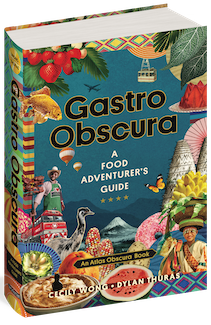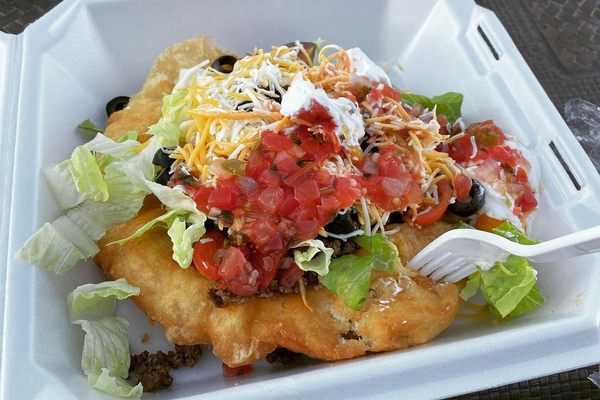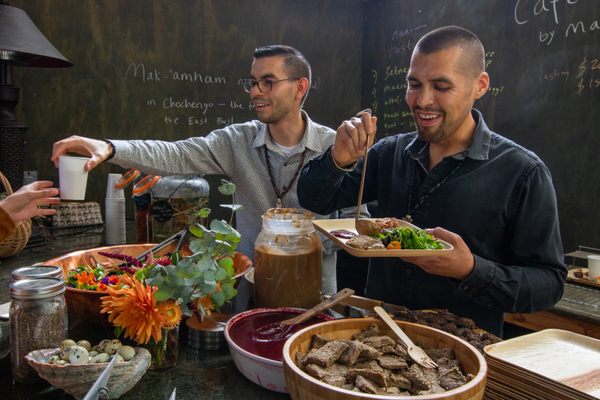AO Edited
Gastro Obscura
Owamni
The dishes at this restaurant by The Sioux Chef celebrate indigenous heritage.
At Owamni, the debut restaurant of chef Sean Sherman, diners dig into dishes like cedar-braised bison with amaranth leaves (served in tacos made from nixtamalized heirloom corn) and rabbit preserved with aromatic conifers and served with fermented blueberries. The menu draws heavily on carefully sourced game meats and freshwater fish, such as trout from Lake Superior, along with produce and grains local to the Americas, such as wild rice and quinoa. What guests won’t find here is any trace of pork, chicken, beef, cane sugar, dairy, or wheat—all ingredients introduced to North America by European colonizers.
Sherman, better known as The Sioux Chef, has dedicated his career to decolonizing North American cuisine. When Native people were forcibly displaced from their historic lands by the United States government, many lost access to the ingredients they had relied upon for generations. The refined flour, sugar, shortening, and other nutrient-poor rationed foods that took their place had devastating consequences. Growing up on the Pine Ridge Reservation in South Dakota, Sherman’s diet mainly consisted of the kind of unhealthy, processed foods that have led to disproportionate rates of obesity, diabetes, and heart disease among Native Americans.
Since 2008, the Oglala Lakota chef has worked tirelessly to educate others about indigenous foodways and traditions, many of which have been threatened by systemic erasure. In 2014, Sherman officially founded The Sioux Chef, which led to the Indigenous Food Lab, a nonprofit training and education center for indigenous foods. Owamni is a natural extension of his mission, a restaurant fully dedicated to cuisine rooted in indigenous ingredients and techniques.
“A lot of cultural identity is wrapped up in food, and it’s an easy way to tell stories,” Sherman said in an interview with Esquire. “The food we’re serving at Owamni tells the story of where it’s from, how it got here, and who you’re supporting by buying it.” Wherever possible, he goes out of his way to source local ingredients from indigenous producers.
Like the menu at Owamni, Sherman’s James Beard Award-winning cookbook, The Sioux Chef’s Indigenous Kitchen, features recipes that eschew any ingredients not native to North America. That means no fry bread, Indian tacos, bannock, or other Native food invented after the arrival of Europeans. Among a growing number of Native chefs and restaurants, such as Cafe Ohlone, Sherman is a powerful voice and the recipient of a James Beard Leadership Award. His work has helped create space for more indigenous restaurateurs, in part because his food is so delicious. From Cheyenne River bison tartare to game sausages made in the Indigenous Food Lab, all of the dishes here honor both regional ingredients and generations of Native culinary traditions.
Know Before You Go
A service charge of 15 percent is automatically added to each bill and distributed amongst the staff. Guests are welcome to provide additional tips for great service.




















Follow us on Twitter to get the latest on the world's hidden wonders.
Like us on Facebook to get the latest on the world's hidden wonders.
Follow us on Twitter Like us on Facebook